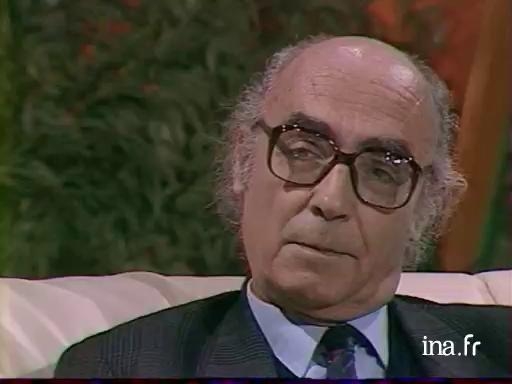Eliane Boucharlat
I'm going to start things off with José Saramago.
You just had The Year of the Death of Ricardo Reis translated into French, it just came out,
and then, there's another book that came out just before.
It was Baltasar and Blimunda.
So right away we're going to talk about your latest book
which truly reveals the way that you write and your style,
The Year of the Death of Ricardo Reis.
So, first of all, explain to us who Ricardo Reis is,
why did you choose this heteronym of Pessõa, the famous poet that's quite well known here?
Explain this to us a bit.
José Saramago
Let's just say that it's kind of my way of getting even.
Ever since I was a teenager, when I met Ricardo Reis,
he really impressed me, his style, his rigour, his discipline with verses,
but on the other hand, he also irritated me and I thought that his attitude towards life, towards society, was disgraceful, to the point where...
It's an ode by Ricardo Reis.
He said: "The wise one is he who is satisfied with the show of the world".
And this contradiction, this sort of aberration to say:
"Myself, I have nothing to do with man.
Me, I'm just a poet".
So, let's just say that in "The Year of the Death of Ricardo Reis", I got even with him and pacified myself.
Eliane Boucharlat
So let's talk a bit about how you've put this book together.
What I mean is that it's a dialogue between a dead man, a man that just died - Pessõa - along with his heteronym, meaning...
José Saramago
Ricardo Reis is someone who doesn't exist.
Eliane Boucharlat
Exactly.
So, explain to us, also, this game of mirrors,
this style free from punctuation marks, without question marks, without exclamation marks...
Also, let's remind ourselves of the role these heteronyms have, does this mean that Pessõa had several sides to his personality?
He wrote using a different name each time?
José Saramago
Yes.
But what I'm thinking is, that all he did was take everything that goes on inside all of us, and did it in an organised manner.
Each one of us has several personalities and identities,
and you have to catch up with them all to pretend that you only have one personality.
With Ricardo Reis, what happened was that Fernando Pessõa accepted his plurality, his diversity,
and he told us, every day when we read his works,
he explains to us that we're not just one but several people, and sometimes they contradict each other.
Eliane Boucharlat
However, through this game of mirrors, do you not in the end show nothingness in your book since...
José Saramago
Not really...
Eliane Boucharlat
Does it exist or not?
José Saramago
Not really nothingness, but rather an awareness that between lies and the truth,
there is just a very thin line of paper.
What separates, and from a writer's standpoint (which is my own), the only thing that separates lies from truth is a piece of paper.
All of us, men and women, are just paper.
That's my belief.
Because we're always referring to what we've read, and what we've read defines how we think.
So then, in "The Year of..."
in this novel, "The Year of the Death of Ricardo Reis", what I wanted to do
was to make it obvious that there isn't a real reason
to be definitive regarding the definition of a lie and the truth.
Eliane Boucharlat
Well, before we hear from [Almeida Ferria], I would just like to announce your upcoming book, "The Stone Raft".
What is this "Stone Raft"?
Explain it to us in a nutshell.
José Saramago
"The Stone Raft" is an Iberian peninsula that is tearing away from Europe during this period of integration and reintegration.
I think that we need to do something more, it's about looking towards the South.
Let's just say that my novel, it's a sort of massive metaphor
to make it clear to Europeans that they can't just remain a sort of stake between the East and the West
and that they have something additional to do, and that's to look towards the South.

















